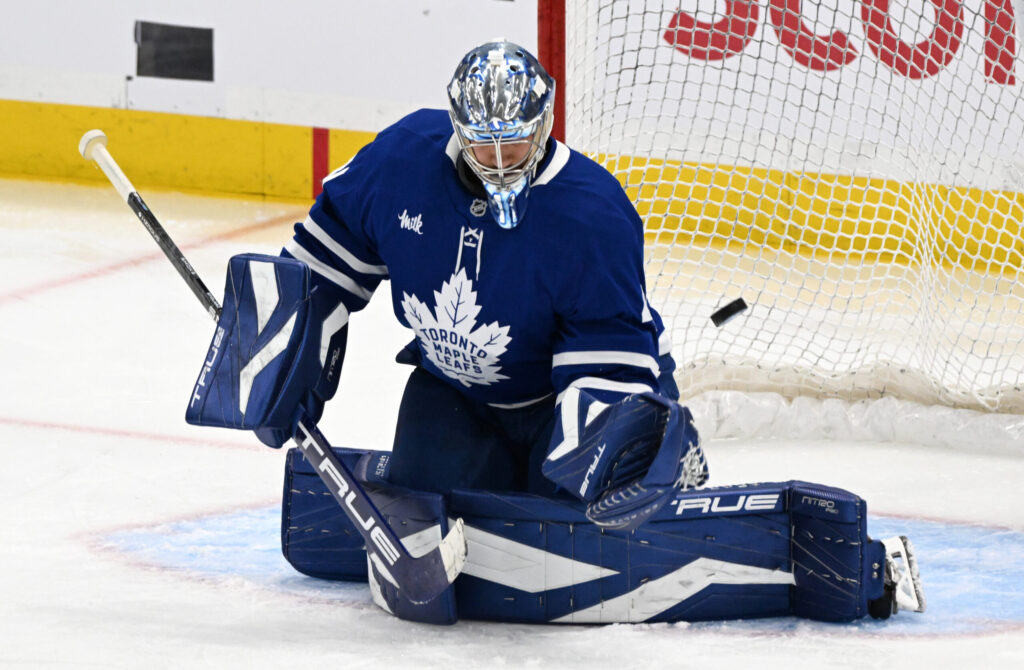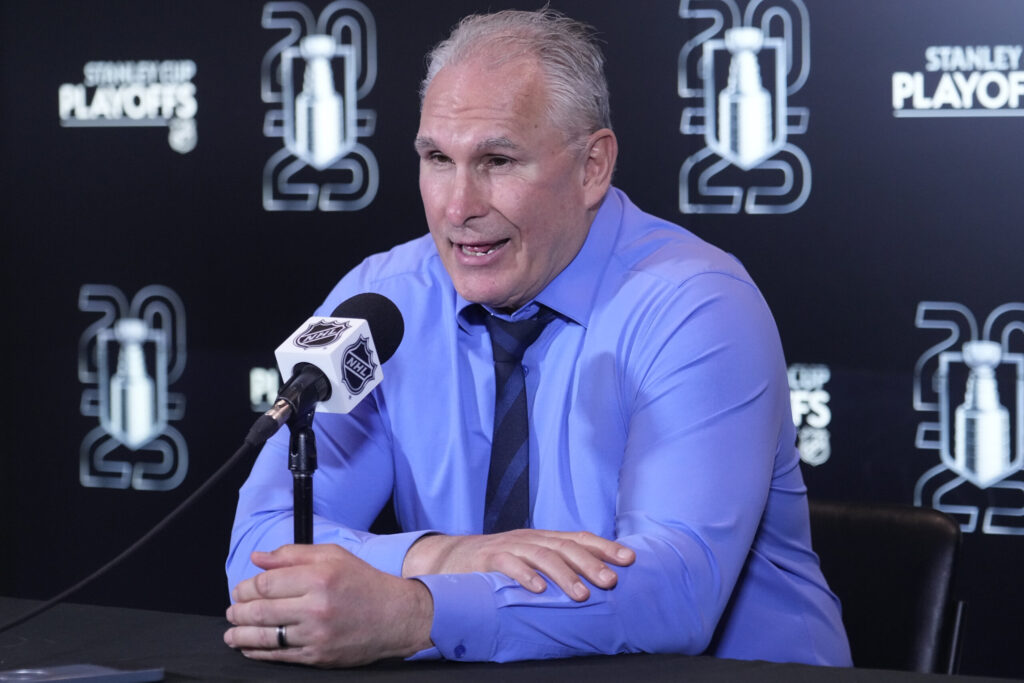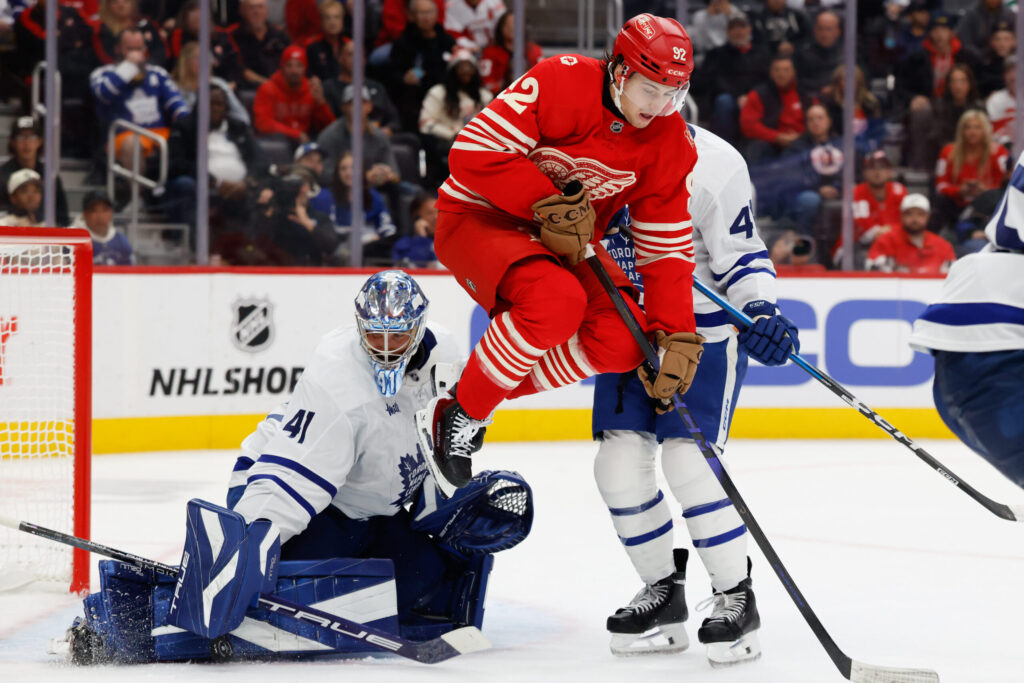It started with the sharp crack of graphite and ended with a blunt assessment that shattered the post-game platitudes typically offered in a losing locker room. Following a 4-3 overtime loss to the Seattle Kraken, Toronto Maple Leafs goaltender Anthony Stolarz didn’t just smash his stick into shards before meeting the media; he dismantled the notion that this was just another early-season loss. His raw, unfiltered critique wasn’t merely a moment of frustration. It was a public demand for accountability that has forced a conversation about the very identity of this Maple Leafs team.
In a few pointed minutes, Stolarz did what many coaches, fans, and analysts have done for years: he called out the team’s core issues of effort and intensity. But this time, the call was coming from inside the house.
Also on the EDGE – Scrutiny Mounts on William Nylander After Coach Berube’s Public Rebuke
The Anatomy of a Call-Out
Forgoing the usual “we’ll get ’em next time” script, Stolarz provided a surprisingly specific and scathing tactical and cultural analysis. He stated plainly that the Kraken had “outworked” the Maple Leafs, particularly through the first forty minutes, and declared that six games into the season, “enough’s enough.” His grievances were not vague; they were a detailed indictment of the team’s performance.

First, he targeted the team’s offensive approach. He criticized a perimeter-oriented game plan of “low to high and shoot,” which allowed the Kraken netminder to see everything. The solution, in his view, was simple and direct: “take a page out of their book and start getting to the net.” It was a critique of offensive softness—a reluctance to pay the price for greasy goals, a hallmark of successful playoff teams.
Second, and perhaps more personally, he called out the lack of protection in his own crease. After being run into by the 225-pound Mason Marchment, Stolarz was left to fend for himself while his defensemen, Brandon Carlo and Jake McCabe, looked on. His frustration was palpable as he recounted flipping his mask and confronting Marchment alone. “I don’t like guys laying on top of me,” he stated, linking the isolated incident to a broader team-wide passivity. The message was clear: the goaltender felt abandoned.
Finally, in his most pointed comment, Stolarz zeroed in on the game-deciding play in overtime. He criticized the “soft backcheck” that allowed Josh Mahura a clear-cut breakaway for the winner. Without naming names, he attributed the lapse to a player who has “been here for a while,” a thinly veiled reference to William Nylander. “You can’t let someone beat you up the ice there,” Stolarz lamented. “That cost us a point there.” It was a direct shot, attributing the loss not to a bad bounce, but to a lack of hard work from a star player in a critical moment.
Closing Ranks or Acknowledging Truth?
The immediate aftermath saw the team’s internal mechanisms kick into gear. Stolarz spoke directly with Nylander, and the leadership group, including Captain Auston Matthews and Head Coach Craig Berube, addressed the situation. Publicly, the players presented a united front, quickly moving to de-escalate.
Matthews described the internal conversation as mature. “We’re a veteran group. We’re all big boys. You don’t need to beat around the bush,” he told reporters. “It’s an easy conversation we all had and you just move on, close the door.” Nylander echoed the sentiment, assuring the media, “It’s all good… we’re teammates.”
This is the standard operating procedure for a professional sports team when internal conflict spills into the public domain. However, the response from the head coach was more telling. While Berube noted he would have preferred the comments remain private, he critically validated the substance of Stolarz’s complaints. Berube conceded that the team was “not clearing out the crease enough” and needed to be “harder around our net.” He also agreed that they needed to improve their own net-front presence in the offensive zone.

Berube’s concurrence lent significant weight to Stolarz’s outburst. It wasn’t just a goalie letting off steam; it was a goalie articulating the exact issues the new coaching regime was brought in to solve. The problem was real, and now it was undeniably public.
A Test for the ‘New’ Leafs Identity
Stolarz’s comments resonate so deeply because they confirm a long-held narrative about this Maple Leafs core. For years, the team has been dogged by accusations of “softness” and a disinclination to engage in the physically demanding, less glamorous aspects of the game—the very things that win playoff series. Stolarz, in his fury, essentially gave voice to the frustrations of a significant portion of the fanbase.
This incident serves as the first major stress test for the cultural overhaul promised by Craig Berube. Hired for his reputation of demanding accountability and forging teams that are “harder to play against,” Berube now faces a situation where a player has taken it upon himself to enforce that new standard publicly.
It is also significant who delivered the message. Stolarz is not a fringe player. He signed a long-term extension and is coming off a Stanley Cup run as a backup with the Florida Panthers, where he witnessed a vocal, demanding leadership group firsthand. He has seen what a winning culture requires, and his willingness to speak out suggests an urgency to instill that same level of accountability in Toronto.
Also on the EDGE – Toronto’s October Buzz: Why the Maple Leafs are Ceding the Spotlight to the Blue Jays
While the players have publicly “moved on,” the questions raised by Stolarz linger. Will this be a catalyst for genuine change, or will it be smoothed over and forgotten by the next game? His public critique shifted the burden of accountability from the front office and coaching staff directly onto the shoulders of the players in the room. It was a wake-up call, delivered not by a coach’s whiteboard diagram, but by the raw frustration of the man they are paid to protect. The door may be closed, but the issues Stolarz laid bare are now in plain sight for all to see. How the team responds on the ice will be the only answer that truly matters.
Created with the aid of Gemini AI
